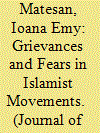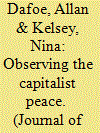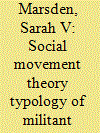|
|
|
Sort Order |
|
|
|
Items / Page
|
|
|
|
|
|
|
| Srl | Item |
| 1 |
ID:
172314


|
|
|
|
|
| Summary/Abstract |
International treaties require ratification to go into effect. But while some treaties have high ratification rates, many do not, leading to a system where issues appear to be addressed on paper but are not in practice. This article seeks to address why treaties receive varying levels of support and finds that factors present during the negotiation phase of the agreement affect the ratification phase. Specifically, bargaining power at and away from the negotiation table influences both the substantive nature of the treaty and the extent to which it will be widely ratifiable. This article explores this issue both in a statistical analysis and in two pairs of qualitative case studies. The evidence indicates that negotiation processes cast a long shadow on the fate of international agreements leading to the current treaty system of prolific international law that is not ratified by most states.
|
|
|
|
|
|
|
|
|
|
|
|
|
|
|
|
| 2 |
ID:
188261


|
|
|
|
|
| Summary/Abstract |
This article analyses the Spanish experience in military operations abroad, studying the functions it carried out in order to demonstrate how expeditionary experience has shaped military change processes. Using a database built from the Spanish Army’s online missions register, as well as from 23 personal interviews conducted with Spanish servicemen, this research focuses on how the Spanish Army has changed through its overseas deployments and how its organisational culture has evolved. The results obtained show a tangible transformation, which has modified procedures, military equipment, and operational functions. There have also been intangible transformations, reflected in the mentality and awareness of military personnel, readying them for deployment anywhere and anytime.
|
|
|
|
|
|
|
|
|
|
|
|
|
|
|
|
| 3 |
ID:
171799


|
|
|
|
|
| Summary/Abstract |
This article examines how exclusionary policies and repressive measures affect the propensity of Islamist groups in nondemocratic settings to engage in violence. The central argument is that exclusion from electoral politics, from civil society, and from public discourse can increase political grievances, whereas symbolic threats to religious values spark sociocultural grievances; state violence and repression foster a sense of insecurity. The article proposes that Islamist groups are both principled and strategic actors, who may adopt violent rhetoric in response to political or sociocultural grievances, but who resort to violent tactics primarily out of a sense of insecurity. The quantitative examination of twenty-two Islamist groups from the Middle East confirms that exclusionary policies can spark violent rhetoric, whereas repression and threats to the physical integrity of a group increase the propensity toward violent behavior. However, when insecurity turns into disillusionment, groups can also move away from violence if they feel alienated from the public. The close investigation of the Muslim Brotherhood and al-Gama'a al-Islamiyya in Egypt shows that the response to repression depends on the length of the conflict, the level of fragmentation within an organization, and public opinion.
|
|
|
|
|
|
|
|
|
|
|
|
|
|
|
|
| 4 |
ID:
166670


|
|
|
|
|
| Summary/Abstract |
This article presents a mixed methods approach for analysing text and image relations in violent extremist discourse. The approach involves integrating multimodal discourse analysis with data mining and information visualisation, resulting in theoretically informed empirical techniques for automated analysis of text and image relations in large datasets. The approach is illustrated by a study which aims to analyse how violent extremist groups use language and images to legitimise their views, incite violence, and influence recruits in online propaganda materials, and how the images from these materials are re-used in different media platforms in ways that support and resist violent extremism. The approach developed in this article contributes to what promises to be one of the key areas of research in the coming decades: namely the interdisciplinary study of big (digital) datasets of human discourse, and the implications of this for terrorism analysis and research.
|
|
|
|
|
|
|
|
|
|
|
|
|
|
|
|
| 5 |
ID:
134154


|
|
|
|
|
| Publication |
2014.
|
| Summary/Abstract |
Countries with open capital markets tend to have fewer militarized disputes and wars. Gartzke, Li & Boehmer propose that this association arises from the enhanced ability of states with open capital markets to credibly signal resolve through the bearing of economic costs ex ante to militarized escalation. We test this causal mechanism by qualitatively examining six crucial cases in which the mechanism is most likely to be operative and observable. We employ a formal case selection strategy designed to yield cases with high inferential leverage for our confirmatory test and to select cases for an exploratory analysis of scope conditions. Through analysis of media reports, government documents, and other sources, we evaluate the extent to which relevant individuals drew the appropriate inferences about market-mediated costs and resolve. We conclude that while market-mediated signaling may operate in major conflicts, it is unlikely to account for much of the association between capital openness and peace. Exploratory analysis of our cases identifies potential scope conditions, clarifies the role of different signaling mechanisms, and suggests other explanations for the peaceful behavior of countries with open capital markets.
|
|
|
|
|
|
|
|
|
|
|
|
|
|
|
|
| 6 |
ID:
173008


|
|
|
|
|
| Summary/Abstract |
How does political polarization occur under repressive conditions? Drawing on psychological theories of social identity, the author posits that the nature of repression drives polarization. Repression alters group identities, changing the perceived distance between groups and ultimately shaping the level of affective and preference polarization between them through differentiation processes. The author tests the proposed causal relationship using mixed-method data and analysis.The results of a laboratory experiment reveal that exposure to a targeted repression prime results in greater in-group identification and polarization between groups, whereas exposure to a widespread prime results in decreased levels of these same measurements. The effect of the primes appears to be mediated through group identification. Case-study evidence of polarization between political opposition groups that were differently repressed in Egypt and Tunisia reinforces these results. The findings have implications for understanding how polarization, as conditioned by repression, may alter the likelihood of the cooperative behavior among opposition actors necessary for the success of democratic politics.
|
|
|
|
|
|
|
|
|
|
|
|
|
|
|
|
| 7 |
ID:
188387


|
|
|
|
|
| Summary/Abstract |
This article analyzes the efficacy of border enforcement against smuggling. We argue that walls, fences, patrols, and other efforts to secure porous borders can reduce smuggling, but only in the absence of collusion between smugglers and state agents at official border crossings. When such corruption occurs, border enforcement merely diverts smuggling flows without reducing their overall volume. We also identify the conditions under which corruption occurs and characterize border enforcement as a sorting mechanism that allows high-skilled smugglers to forge alternative border-crossing routes while deterring low-skilled smugglers or driving them to bribe local border agents. Combining a formal model and an archival case study of opium smuggling in Southeast Asia, we demonstrate that border enforcement has conditional effects on the routes and volumes of smuggling, depending on the nature of interactions between smugglers and border agents. By drawing attention to the technological and organizational aspects of smuggling, this article brings scholarship on criminal governance into the study of international relations, and contributes to debates on the effects of border enforcement and border politics more generally.
|
|
|
|
|
|
|
|
|
|
|
|
|
|
|
|
| 8 |
ID:
148926


|
|
|
|
|
| Summary/Abstract |
Typologies are ubiquitous in terrorism studies, illustrating their continued appeal as a tool to further our understanding of this form of political violence. Despite this, to date, the promise of an empirically derived typology has largely been neglected. In addressing this gap, this article sets out a typology developed from Social Movement Theory. Using a novel statistical technique to derive a three-dimensional framework for categorising militant groups, the typology incorporates both organisational characteristics and the wider political context. The result is a typology defined by three conceptual constructs: political capacity, war-making capacity, and network capacity. Alongside these organisational features, imposing measures of the wider political opportunity structure reveals eight types of militant organisation. To explore the utility of the framework, a preliminary analysis interprets the typology in light of the presence of wider conflict. That a robust relationship is found between the various types and whether groups were operating in peacetime, civil war, or low-intensity conflict, goes some way to demonstrating its utility as an analytical tool. Conclusions draw attention to the importance of contextualising militant groups in their socio-political setting, and the benefits of combining theory alongside empirical analysis to develop robust characterisations of violent organisations.
|
|
|
|
|
|
|
|
|
|
|
|
|
|
|
|
| 9 |
ID:
177318


|
|
|
|
|
| Summary/Abstract |
This paper aims to fill a research gap in the area of consumer-citizen attitudes to business models for decentralized energy storage, at the level of households and buildings. The study focuses on the interaction of such attitudes and their underlying motivation factors with socio-cultural, contextual factors. Self-determination theory (SDT) is used as a theoretical framework, to connect interpersonal and contextual factors, addressing the question of how contexts influence the motivation to support energy storage. Drawing on SDT, this study examines the role of autarky (independence from the energy system), autonomy (control over energy management) and relatedness (degree of sharing required) in this regard, embedded and interpreted in the socio-cultural local context of two demonstration sites in Sweden and Portugal. A mixed method approach is used. Quantitative survey data provides information on local social and cultural dimensions, followed by stakeholder consultation workshops that elicit participants’ views on different models of decentralized energy storage. The findings raise questions of how to improve autarky and autonomy for prosumers, while keeping the need for time investment low and provide flexibility regarding the required degree of interaction between prosumers. Implications for business models and policy support for citizen-centered sustainable urban energy systems are derived.
|
|
|
|
|
|
|
|
|
|
|
|
|
|
|
|
|
|
|
|
|